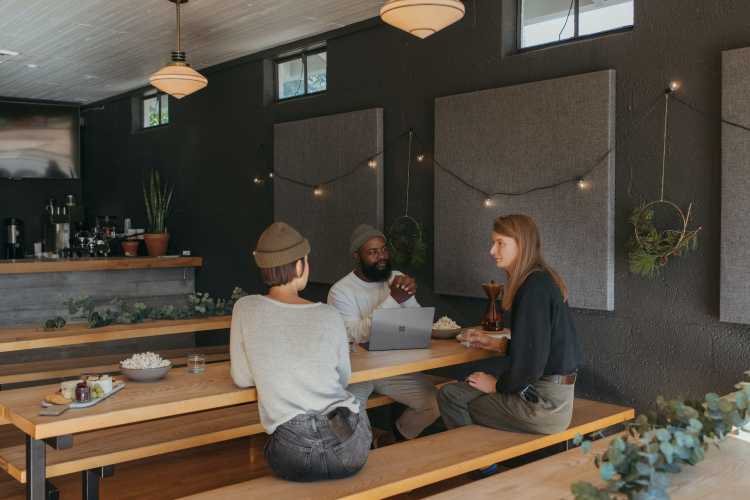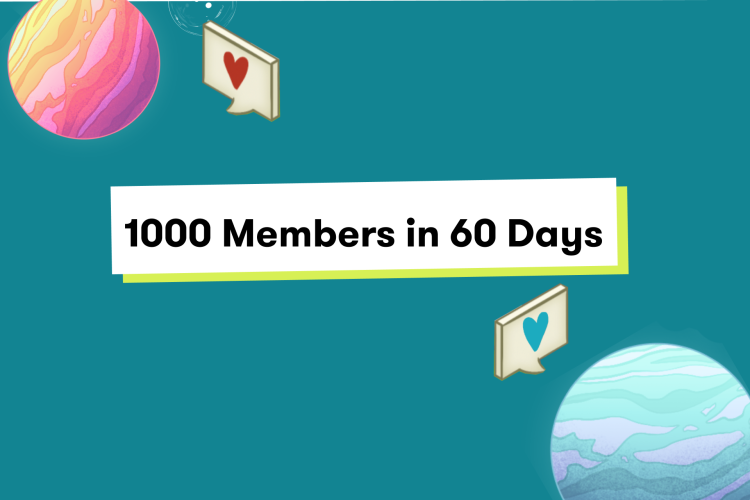Communities & Memberships
How to Grow a Facebook Group & Increase Engagement
Here are the do’s and don’ts for getting a Facebook group started and growing an engaged community.
Author
Gina Bianchini
Last Updated
February 6, 2025

Table of Contents
Up until recently, when you heard someone say “community,” you just assumed they meant a Facebook group.
With 2.6 billion users, nearly everyone on the planet with an Internet connection also has a Facebook account. Given this, it seems pretty obvious that if you want to grow a community you’d start with a Facebook group. I mean, no one is going to get mad at you for that, right?
Yet, today, there are very specific reasons to create a Facebook group and put the work into delivering an engaged community there.
As well as a whole host of reasons not to.
Why? Because in the past few years a new class of community platforms have emerged that replace the need for you to simply create a Facebook group in all cases. Especially if you are running online courses, launching a membership site, or understand the power of having your own direct relationship with your members off Facebook, you have options now that you didn’t have before.
This means you can be pickier in how and where you choose to grow a Facebook group or increase your Facebook group engagement.
If you want more support in building your online community, come join OUR Mighty Community for free and meet other new and established community owners! We’d love to meet you. Join for free!
How to grow a Facebook Group
The best way to grow your Facebook group is to first understand what, exactly, Facebook can and cannot do for the community you build there.
At first glance, Facebook groups look like the right place to build your community because “everyone is already on Facebook and doesn’t want to have yet another login.”
But this just doesn’t hold true anymore. Many people are increasingly nervous about their privacy and don’t trust Facebook, some want to more naturally meet fellow members, and others seek focus and simply want to avoid the noise and distractions of social media as they master something important you are offering. The reasons to create or grow a Facebook group are getting narrower and more rare.
So when do you want to grow and engage a Facebook group versus looking at Facebook group alternatives? It makes sense to create or grow a Facebook group when:
Your reason for starting a Facebook group fits what people want to do on Facebook. If you want to start a group for sports fandom, political conspiracies, or more divisive or lightweight “throwaway” topics that lend themselves to memes, quick cynical quips, or that reinforce someone’s existing belief systems by connecting them to people who believe the same things, Facebook groups remain the best platform to use.
Why? Because the Facebook algorithm will ensure that you get a steady stream of new people to see your group and the engagement model is perfect for a newsfeed that counts a view as less than three seconds of a post whizzing by. In practice, Facebook groups are fantastic when the goal is quick, superficial likes by many people who want to belong.
You already have an established Facebook group. If you’ve already invested in creating and growing a Facebook group over the past few years, then it may make a lot of sense to continue to use it to surface your group to new prospective members and build the widest audience possible for wherever you want to take it in the future.
This option isn’t available to everyone, especially new folks evaluating whether a Facebook group is the right place to start a community from scratch today (sadly, it may not be). But for those with established groups getting a steady flow of free new members from Facebook search, keeping your Facebook group open and public makes sense.
You think you can tap the Facebook search algorithm for free traffic and new members.
Lastly, if you believe that you can tap Facebook’s complicated ranking system that determines what they show on people’s newsfeeds for free for any other reason than the two above, then do it.
The Facebook platform considers who a user typically interacts with, the type of media in a post (whether it’s a video, link, or photo), as well as the popularity of the post in a complex “black box” calculation that’s difficult to understand, let alone master. But if you have a unique insight or edge that will make your Facebook group stand out from the competitive groups, it’s potentially worth making the investment of your time, energy, and creativity in getting your group to show up in search results on Facebook or promoted to other users in similar groups.
But be forewarned: it will be constant work with a strong risk of not working at all.
When doesn’t it make sense to grow a Facebook Group?
As you can tell from the narrowing reasons to grow a Facebook group above, the number one reason not to create a Facebook group is when the only way to grow your Facebook group is through buying traffic and visibility from… Facebook.
Even when article after article tells you that the “right” way to build a community in 2022 is to:
First, create a Facebook group and invite your contacts and friends to it (you do the work bringing your contacts to Facebook).
Then, create a Facebook page (which is another feature to manage separately from your Facebook group that serves as their “gateway” to telling you to buy ads).
Then, start paying for ads on Facebook so that people can find your Facebook group.
Don’t listen to the “experts.” This is a bad deal for you. Unless you fit one of the three scenarios above where you can tap Facebook for free traffic to grow your Facebook group, you should think very carefully about buying ads to your Facebook group. Here’s why:
Your members are not guaranteed to see the posts that you make in your Facebook group. You’re at the mercy of Facebook’s algorithm, so there is also no guarantee that they will see messages you send them or other ways you want to reach them. This means a Facebook group is more limited in what you can do with it than you may think at first.
You will not get from Facebook any of the email addresses or other ways of contacting your members outside of Facebook. This means that if you are buying ads and getting new members to your Facebook group, there’s no guarantee that you will be able to reach them down the road unless you pay Facebook more money.
So, in essence, while you created a “free” Facebook group, they are designed such that Facebook gets paid when you want new members, even though the group itself also benefits Facebook with the data from your group activity they then use for better ad targeting.
In the case that you want to buy traffic from Facebook (as it is a great source of traffic, for sure), think about creating your virtual community on a platform where you have 100% access to every member while still getting great engagement under your own brand. While this wasn’t really an option in the past, today there’s a new breed of community website software available to do this. And they will give you a much higher return on investment.
5 Tips to grow a Facebook group organically
If you are in one of the optimal categories for growing a Facebook group for free, there are five things to focus on to grow your Facebook group:
Make your Facebook group’s title and description as clear as possible in who you want to serve and what you’re going to do together. The goal is to get new members, so you want Facebook’s search algorithm to find your group. Be clear, concise, and specific.
Customize your group’s URL, so that it’s easy to remember, and Facebook’s algorithm knows what you do. Every one of your “touchpoints” should be focused on getting Facebook to send people to you for free. Your URL is a great asset in this effort.
Post relevant content often. Now, it may feel like the goal of posting engaging content is to, well, engage your members. It’s actually not the point. The point of engaging posts on Facebook is to show activity to the algorithm so that it ranks you as a valuable group and shows your group to more people organically (read: free).
Promote, promote, promote. There’s no way around it. Growing a Facebook group even with the strategy of tapping Facebook for free traffic still requires you to promote your group, even with its lower return on investment and lack of direct member relationships. Look to give your members a reason to share your group and invite their friends and family, not just using the basic, built-in share features on Facebook, but using other more creative ways as well.
Continue to invest in your “Plan B,” a direct relationship with your members. Lastly, even as you’re investing your time and energy in unlocking Facebook to grow your Facebook group, make sure that you’re doing all of this work with an eye towards a direct relationship with your members. Use the application questions (the questions you can ask before you let a member into your Facebook group) to ask members to contact them, set up an email list, or even better, create a website where they can also join and that gives them a reason to come back.
How to keep a Facebook group engaged
Now that you have a plan for when, how, and the right way to approach growing your Facebook group, you can shift to thinking about how to best engage one.
The best engagement strategies for your Facebook group are to prioritize the following principles:
Work smarter, not harder. Engagement is not about the content you produce for your Facebook group. It’s about the conversations and relationships your members are striking with each other. Focusing on activities in your group that build relationships is what matters. Plus, it’s a heck of a lot easier to do than writing new posts once you know a few simple techniques.
Define a “Big Purpose,” or motivation for your members to be a part of the group. The source of all community engagement is the motivation for your community. Put simply, what will your members get as a result of being a part of your Facebook group? Will they have a deeper sense of belonging or is there something that you’re bringing them together to master together?
Now, this matters less for any of the groups that were mentioned earlier, such as those where conspiracies or tribalism fuel all the lightweight engagement that Facebook optimizes for. But for a topic where you’re bringing together people from different backgrounds or if you want to encourage people to share more deeply, being clear on members’ motivation–and the results they’ll get for participating–matters.
Embrace a consistent schedule to create a habit for your members (and you). Ultimately, you want to train your members and the Facebook search algorithm when to expect something from your Facebook group, even if they are following along and not yet engaging.
Use compelling questions and polls to get your members talking to each other. Once you have a Big Purpose and a consistent schedule that’s building a habit among your members (and yourself, actually), you can drop in daily questions and polls designed to get your members to contribute their stories, experiences, and ideas–connecting them to others in the process.
These principles are just the tip of the iceberg in capturing the patterns that are proven to deliver engagement in a Facebook group or across communities more broadly.
In fact, these principles come from a framework called Community Design™ Accelerator, which has five steps and five key agreements to deliver a thriving community valuable enough you can charge for it, and where your members will essentially run your community themselves.
In terms of agreements that Community Design™ Accelerator embraces and will help you deliver a more engaged Facebook group, here are a few things to embrace:
Try new things. Use your Facebook group to experiment with new formats, new questions, and new ways to connect your members.
Stay curious. As you try new things and talk to more of your members, stay open to what you’re hearing and use what you hear to try new things. It’s what will bring you new energy, joy, and creativity in running your Facebook group, and is one of the key reasons to create a community in the first place.
Reframe challenges into new questions. If you post something that gets no engagement or run across a dissatisfied member, seek to reframe your initial reaction into something more constructive. For example, ask yourself, could that post have been clearer in what I wanted members to do with it? Or, is this the right kind of member I want to serve going forward? Reframing your reaction from one of failure into something new to learn will help you grow your community and deepen the value of what you’re creating.
Ask for ideas and feedback. While you want to lead a community with a starting point of view and structure, don’t be afraid to also ask your community for ideas on where to go next. You don’t have to have every answer, just the structure for your members to get results from your community and feel comfortable talking to each other.
Explore a deeper dive into community design
When you embrace Community Design™ Accelerator to grow and engage a community, you can do much more than simply run a Facebook group. You can use Community Design principles to:
Bring people together on your own website where they can meet each other
Create a membership site or your first online course
Introduce virtual conferences, training programs, or workshops
Combine your online courses and community all in one place, all under your brand, and instantly available on every platform
It’s a powerful program, especially used in conjunction with the new breed of community platforms available for different community use cases no longer adequately served by Facebook groups alone.
One of these platforms, Mighty Networks, even offers a Community Design™ Accelerator as a live, five week online course guaranteed to get you growth and engagement across any community, including a Facebook group.
When you’re ready to dive into these principles further in order to work smarter, not harder, this may be the right path for you.
What’s the best way to grow a Facebook Group?
In conclusion, communities are, first and foremost, about the people who populate them, and the relationships that your members build with each other. With Facebook groups alone, there’s no guarantee that your members will see your content or even other members, which means there’s a greater chance that they’ll miss out on making the connections that ensure community thrives.
And yet, when you apply the principles of Community Design™ Accelerator, whether on Facebook groups or another platform like Mighty Networks, you’re giving your members a greater chance to connect with each other, which in turn allows them to get closer to their goals, together.
Grow Your Facebook Group with Community Design™ Accelerator
Ready to start building your community?
Start a free 14-day trial to explore Mighty—no credit card required.
More like this
Join Mighty Community
Learn the principles of Community Design™ (and see them in action) alongside thousands of creators and entrepreneurs. It's free to join!

Online Courses
Creating a Course
Teaching a Course
Course Platforms
Selling a Course
Communities & Memberships
Community Platforms
Managing a Community
Building a Community
Growing a Community
Monetizing a Community
Content Creation
Creators & Entrepreneurs
Monetization
Content Creation
Starting a Business
Website Builders
Creating & Managing a Website
Events
Event Platforms
Hosting & Marketing Events
Branded Apps
Creating a Mobile App
Coaching Apps
Community Apps
Coaching
Mastermind Groups
Starting a Coaching Business
Coaching Platforms
Filter by Category
Online Courses
Communities & Memberships
Creators & Entrepreneurs
Events
Branded Apps
Coaching
Start your free trial
14 Days. No Credit Card Required.





















